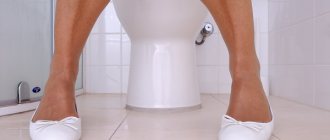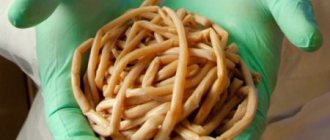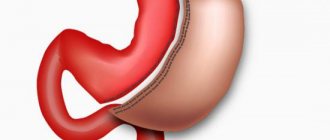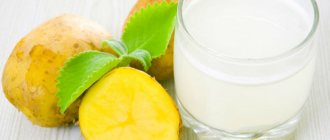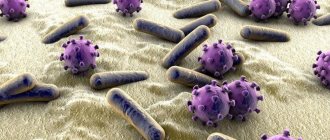loading…
Diarrhea is a serious digestive disorder that occurs for various reasons and requires mandatory treatment; it is not always possible to cope with this symptom on your own; choosing the right medicine for diarrhea is not easy. At the same time, you should not trust advertising or the advice of friends.
Diarrhea can quickly lead to dehydration and organ dysfunction if the wrong medications are taken or left untreated.
Your doctor will tell you how to stop diarrhea quickly and effectively. But having an idea of the existing means is useful for every person.
general information
A pathology for an adult is considered to be an increase in stool frequency up to 3 or more times during the day and a change in its consistency to the liquid side, especially when combined with abdominal pain, the appearance of foreign inclusions in the stool (mucus, blood, pus) and a disturbance in general well-being.
Diarrhea is not a disease at all, but a symptom of some kind of problem in the gastrointestinal tract or the body as a whole.
Sometimes an external examination of stool can already suggest a diagnosis. For example, green diarrhea occurs with salmonellosis, profuse, bright yellow and watery diarrhea occurs with viral enteritis, with mucus and streaks of blood with dysentery. However, the diagnosis must be carried out by a doctor who will determine the cause and help choose an effective remedy for diarrhea.
The reasons for the appearance of loose stools in adults can be different:
- Infectious diseases - acute enteritis or enterocolitis caused by pathogenic bacteria (salmonellosis, dysentery, cholera), parasites (giardiasis, amebiasis), worms or viruses (a group of enteroviruses or rotaviruses). Infection occurs through food, water, dirty hands or through direct contact with a sick person, poisoning with poor-quality food.
- Inflammatory diseases of non-infectious etiology - Crohn's disease (total damage to the entire gastrointestinal tract), lymphoma, ulcerative colitis (pathology of the large intestine), ischemic or radiation damage to the intestine.
- Dietary errors - consuming large amounts of vegetables, fruits, fermented milk products and other foods that cause increased gas formation and increased peristalsis in the intestines, as well as alcohol.
- Enzymopathies of a congenital nature - lactase deficiency (milk is not digested), or acquired during life - with cholecystitis, chronic pancreatitis, diabetes.
- Impaired absorption of individual food ingredients - primary malabsorption (celiac disease, cystic fibrosis) or secondary - in cancer, cirrhosis of the liver.
- Imbalance of the microflora of the large intestine (after operations, long-term treatment with antibiotics, chemotherapy).
- General severe diseases (secondary diarrhea due to sepsis, purulent diseases, influenza, etc.).
- Irritable bowel syndrome is a functional digestive disorder associated with problems in the central nervous system.
Why does diarrhea occur?
Before understanding which drugs are best to help cope with diarrhea, it is necessary to note what this process is and what reasons most often lead to its development.
Diarrhea is an increased urge to defecate, usually accompanied by loose stools. This process is not an independent disease, but is included in the clinical picture of various disorders associated with digestion.
In addition, attacks of diarrhea are accompanied by acute, sharp pain in the abdomen, a decrease in general health, nausea, vomiting, and in some cases an increase in body temperature.
Common causes leading to diarrhea:
- manifestation of an acute food allergic reaction or allergy to a medication;
- inclusion of tap water in the diet, such liquid often contains pathogenic microorganisms;
- food intolerance to a particular food product;
- parasitic, viral or bacterial infections;
- prolonged stay in a state of psycho-emotional overstrain, stress;
- chronic inflammatory processes;
- irritable bowel syndrome disease;
- absorption failures;
- malignant neoplasms of the digestive system.
Only after determining the cause, that is, after conducting diagnostic studies, can the doctor prescribe effective medications for both adults and children that will help achieve treatment results.
Principles of therapy
In most cases, diarrhea can be treated at home, but it should be understood that self-medication is only permissible in mild forms of the disease and there is a clear reason for the indigestion.
When does diarrhea in an adult require hospitalization:
- if frequent loose stools persist for more than 3 days without improvement, despite treatment;
- signs of dehydration are increasing - dryness of the oral mucosa, lips, tongue, drop in blood pressure, weakness and dizziness, lack of urination for more than 6 hours in a row;
- diarrhea is accompanied by fever, vomiting, abdominal pain or skin rashes;
- bloody diarrhea or melena (black stools);
- diarrhea in a pregnant woman or nursing mother (can cause complications for the child).
In all other cases, you need to call a doctor home.
Only a specialist can establish the cause, conduct an examination to clarify the diagnosis and prescribe appropriate medications.
Any remedy for diarrhea should be taken in strict accordance with the recommendations in order to avoid possible complications and worsening of the condition.
Regardless of the cause, diarrhea should be treated according to the following rules:
- Carry out oral rehydration during the first 6 or 12 hours (depending on the patient’s condition) - the therapeutic effect against loss of fluid and electrolytes is achieved by fractional intake of saline solutions (a tablespoon every 5-7 minutes).
- Take sorbents (activated carbon, Polysorb, Filtrum or others) to neutralize toxins, viruses, bacteria that have not yet had time to attach to the intestinal villi and damage them, as well as to remove all the bad things out.
- Take antibacterial drugs against infectious agents of diarrhea only as prescribed by a doctor, especially for a pregnant woman or nursing mother.
- Observe a fasting pause for the first 6-12 hours, followed by a transition to a gentle diet until stool normalization and a gradual return to the patient’s usual diet.
Folk remedies
Of course, pills for diarrhea have not always existed, while the problem itself is as old as the world.
Our ancestors learned to fight diarrhea with various folk methods, and many adhere to a similar treatment concept to this day.
The most popular folk remedies to combat diarrhea are:
- salt dissolved in water, in some cases in vodka;
- strong brewed black tea;
- a solution based on starch;
- blueberry jelly;
- black peppercorns;
- rice water
The strategy for dealing with diarrhea is quite simple. The first thing you should pay special attention to is drinking plenty of fluids, which can be strong black tea without sugar. You should not drink green tea, because it has a laxative effect.
To retain the resulting fluid in the body, you need to take a saline solution.
This drink, in addition to retaining fluid, also performs several other functions, namely, it neutralizes toxins and allows for the normalization of processes in the intestines.
READ Review of folk remedies for diarrhea
To combat diarrhea in adults, a saline solution is made at the rate of two teaspoons per 250 milliliters of boiled water.
Video:
This method should take effect within five hours. It should be remembered that salt is harmful to the human body, so you should not consume it in large quantities.
Dried blueberries have astringent antiseptic properties, so jelly made from them, which is based on potato starch, can serve as an excellent remedy for diarrhea.
A true folk remedy is vodka or any other strong alcoholic drink with salt.
The proportions of such a folk medicine are as follows: one tablespoon of table salt per 250 grams of vodka, which can be slightly diluted with warm water.
If you don’t have time to prepare particularly complex remedies for diarrhea, peppercorns will come to the rescue.
Diarrhea can be overcome with just ten peppercorns. It should be remembered that this folk remedy is not suitable for people with stomach diseases, such as gastritis or ulcers. Taking pepper can aggravate these ailments.
Oral rehydration
Particularly severe water and electrolyte losses are observed with diarrhea of infectious etiology (acute food poisoning, intestinal flu, cholera). Compensating for the loss should begin as early as possible, even before being examined by a doctor. For this, an ordinary mineral water without gas or a product prepared at home according to a simple recipe is suitable - dissolve a couple of tablespoons of sugar and 1 teaspoon each of baking soda and table salt in 1 liter of clean drinking water.
You should not try to quickly give the patient something to drink; a saline solution heated to body temperature should be given in fractions, every 5 or 7 minutes, a sip or a tablespoon, then it will not provoke vomiting, but will be absorbed by the cells. An adult should drink at least 1 liter in 6 hours.
The best option for diarrhea for all family members is a pharmaceutical preparation, manufactured industrially in the form of a powder based on sodium, potassium and glucose salts.
You should always have such a remedy at home - if a situation arises, it is simply dissolved in the appropriate amount of boiled, cooled water according to the instructions. If the disease is not severe and the instructions are followed correctly, such therapy will help cope with diarrhea even without additional medications. This is especially important for pregnant and nursing mothers, children and the elderly when it is impossible to use other medications.
List of the most common medications that need to be taken during oral rehydration:
- Regidron is a drug in the form of a salty-tasting powder that contains sodium citrate, chlorides (sodium and potassium), and dextrose. The bag is dissolved in 1 liter of boiled but cooled to body temperature water. The solution must be made immediately before use; storage in the refrigerator for 24 hours is allowed. This drug should not be taken if you have diabetes, kidney failure, intestinal obstruction, or given to an unconscious person.
- Trihydron - the solution is prepared at the rate of 1 sachet per half liter of boiled water; an adult with an average weight of 75-80 kg will need to drink about 1-1.2 liters of the prepared product within 6 or 12 hours. The contraindications are the same as for Regidron.
- Gastrolite - contains bicarbonate and sodium chloride, glucose, potassium chloride and chamomile flower extract. A sachet of this medicine is poured into a glass of hot boiled water, stirred and cooled.
- Glucosolan - the product is sold in two sachets (the first contains glucose, the second contains sodium bicarbonate, potassium and sodium chloride), they are dissolved in a liter of water.
loading…
- Citroglucosolan - the drug is available in single sachets that contain unequal amounts of sodium, potassium and sugar salts. The powder dissolves in the volume of boiled water indicated in the instructions for each package.
- Hydrovit forte - has the same composition as Regidron, but the solution needs to be made in a different proportion - 1 sachet per glass of drinking water or tea. It should be drunk immediately after preparation.
Enterosorbents
This is the most popular group of drugs, used by humanity since ancient times for any poisoning. Activated carbon was the first remedy that began to be actively used against bloating and diarrhea since the century before last. This drug has not lost its importance even today - it quickly helps with food poisoning, infections and intoxications.
In recent decades, activated carbon has begun to be replaced by modern analogues that have greater adsorbing power and effectiveness against toxins, poisons coming from outside or formed inside the body, as well as allergic substances, radioisotopes and heavy metal salts.
What results can the use of new generation sorbents give:
- Adsorption (binding and neutralization) of pathogenic microbes, allergens, toxins of any origin located in the intestinal lumen. If you drink sorbents on time and in the right dose, you can prevent the absorption of poisons into the blood and their spread throughout the body.
- Detoxification - removal of adsorbed toxins and poisons, cleansing the intestines in case of poisoning and infection, restoring normal physiology in organs.
- Stopping diarrhea - these drugs (including activated carbon) act against the destruction of intestinal wall villi by microbes, which helps normalize the process of reabsorption of water during diarrhea of any origin (in case of errors in eating, infection, poisoning).
- Restoring the microbial balance of the colon - many modern sorbents (activated carbon is not one of them) contain probiotics, which create a favorable environment for the growth of good bacteria against bad microflora, which strengthens local immunity.
- Safety - activated carbon and other enterosorbents can be used for a child of any age, pregnant and nursing mothers without restrictions.
The most popular adsorbents for diarrhea in adults:
- Activated carbon - in case of poisoning and diarrhea, it should be drunk in crushed form at the rate of 0.5 g. per 10 kg of human weight. The drug does not dissolve in water; it should be taken as a suspension in a small amount of liquid.
- Smecta (Neosmectin, Diosmectin) is a natural drug against bloating, heartburn and diarrhea for patients of any age. It is positioned as a children's remedy, but can also successfully treat adults. Available in powder form, packaged in single sachets. It is prescribed in a dose of up to 3 sachets per day, before use it is dissolved in a third of a glass of warm drinking water, it must be drunk immediately to prevent the powder from settling to the bottom, strictly between meals. The course of treatment is from 3 to 7 days depending on the diagnosis.
- Enterosgel is an organic substance containing silicon, available in the form of a gel, suitable for nursing mothers and children of any age. Effectively acts against acute and chronic intoxications of any nature (poisoning, infections, allergies). Adults are prescribed one and a half tablespoons three times a day, children - according to age. The drug may have a side effect - constipation.
- Polysorb is a very effective domestic enterosorbent of a new generation. Activated carbon is hundreds of times inferior to it in terms of sorption effect. A light, tiny powder is diluted in a third of a glass of water, the dose depends on body weight and purpose; adults usually need three tablespoons a day in between taking other medications and meals (be sure to allow an hour for the drug to take effect).
- Filtrum is a modern sorbent made from hydrolytic lignin, produced in the form of tablets, prescribed for poisoning, intoxication and intestinal infections in a dose according to the instructions. Contraindicated for ulcerative processes in the gastrointestinal tract (like activated charcoal) and intestinal atony.
- Lactofiltrum is a sorbent that regulates the balance of intestinal microflora and quickly helps with diarrhea from dysbacteriosis and IBS.
Symptomatic antidiarrheals
Medicines that affect the motor activity of the small intestine can eliminate diarrhea and its consequences.
The drugs are safe for people who are not allergic to their components and are available in pharmacies without a prescription.
These tablets are universal and help reduce the occurrence of diarrhea. Their action is based on slowing down the progress of the food bolus by reducing the tone of the intestinal walls.
The list of such tablets is quite extensive. The main ones include Imodium, which is used not only for vomiting, but also for diarrhea.
The effect of taking it is noticeable after 45 – 60 minutes. Imodium is used to treat frequent occurrences of diarrhea caused by poor diet and stress.
Video:
These tablets are indispensable on the road; they do an excellent job of “traveler’s diarrhea.” The maximum daily dose of the drug for adults is eight milligrams.
Imodium should not be given to children under six years of age. In addition, these tablets are not recommended for pregnant women in the first and third trimester.
Another universal remedy for diarrhea is Loperamide, which adsorbs gases in the small intestine and relieves bloating and pain.
Loperamide is prescribed to persons over twelve years of age. The daily dose of this drug is four tablets. If the stool returns to normal or disappears altogether, the drug should be stopped.
Of course, it is best to take pills for diarrhea only after consulting a doctor who can understand the reasons for its occurrence.
READ Possible causes of loose stools in the morning
But if it is not possible to seek help from a specialist, then it is best to take the inexpensive and effective pills listed above.
If the diarrhea does not stop or even gets worse, then you need to look for an opportunity to turn to specialists for help.
Antimicrobials
Not every diarrhea in an adult or child requires antibiotics. Only a doctor can determine the need to prescribe such drugs. Absolute indications are diseases such as cholera, dysentery and salmonellosis, which can be very severe and cause complications.
Often, a doctor prescribes antimicrobial drugs for diarrhea in adults to treat intestinal infections at home, with an exception made for small children, a pregnant woman and a nursing mother. This category is usually sent to the hospital.
List of the most commonly used medications for poisoning and diarrhea of infectious origin:
- Nitrofurans (Furazolidone, Enterofuril, Ersefuril, Nifuroxazide, Stopdiar) are antimicrobial drugs that are prescribed against mild and moderate infections - the usual dose for an adult is 2 tablets 3 or 4 times a day after meals, for children according to age. The average course is from 7 to 10 days.
- Products of biological origin (Enterol, Probifor) are created on the basis of beneficial microbes that are antagonists of pathogenic bacteria. Probifor contains activated carbon with bifidobacteria. Helps with diarrhea of any origin, they are allowed to treat all categories of patients, including loose stools in a pregnant woman and a nursing mother. Dose for adults: 3 to 6 capsules per day, depending on the condition. Enterol should be taken 1 sachet (or capsule) up to 3 times a day.
- Antibiotics - prescribed only by a doctor; broad-spectrum drugs (Rifampicin, Alpha Normix, Levomycetin) are usually used in cases where the question is how to stop diarrhea quickly and reliably in severe forms of the disease (dysentery, cholera, salmonellosis). Antibiotics should be taken in the dose prescribed by the doctor; taking breaks or stopping them on your own is not recommended.
Types of anti-diarrhea remedies
Before you look for effective pills for diarrhea, you should determine what caused the condition. In addition to taking the direct medication, adults and children need to take other medications to prevent dehydration and adverse drug reactions. All remedies for diarrhea are divided into 5 types:
- perilstatics
- drugs that slow down contractions of the walls of the rectum; - antibiotics
- medicines to fight intestinal infections; - probiotics
- eliminate symptoms of dysbiosis; - enterosorbents
- increase absorption, reduce the impact of pathogenic microorganisms on the intestinal microflora; - folk remedies
- herbs, plants and other products with astringent and tanning effects.
You can buy quick-acting medicine for diarrhea at any pharmacy; they are inexpensive and available without a prescription. But with severe pain, high fever, general weakness and vomiting, accompanied by diarrhea, you cannot self-medicate. It is better to immediately consult a doctor, and he will determine the procedure for treatment.
Restoration of microflora and peristalsis
Extremely popular remedies are probiotics or drugs of biological origin, which are used to normalize the microbial balance of the large intestine, restore digestion and stimulate local defense mechanisms.
Probiotics are prescribed independently for non-infectious intestinal disorders, and are also part of complex therapy for intestinal infections, poisoning and inflammatory diseases of the digestive system.
It is recommended to drink them in preventive courses in the autumn-spring period, especially during or after treatment with antibiotics.
List of the most common means:
- Hilak Forte drops - biosynthetic lactic acid, prepares a favorable environment in the intestines for the colonization of beneficial microflora, improves appetite, eliminates symptoms of dyspepsia, including diarrhea;
- Linex capsules - containing lacto- and bifidobacteria, enterococci, adults need up to 6 capsules per day in three doses, the course of treatment is usually long (depending on the condition);
- Bifiform - contains bifidobacteria, enterococci and B vitamins, works well against travelers' diarrhea and non-infectious intestinal disorders;
- Normobact - consists of bifidobacteria and lactobacilli, taken in a daily dose of 2 sachets for adults for 2 weeks.
Intestinal motility agents can be used against loose, watery stools in adults to prevent excess fluid loss.
Diarrhea in adults can be caused by a variety of reasons, not just infection.
Therefore, any unclear questions should be discussed with a doctor, and not do anything stupid by self-medicating.
loading…
Share: Facebook
1 Comment
- Victor says:
10/01/2019 at 11:29
Diarrhea in an adult can mean a lot of things
Answer


